Roman Consuls Seized Power Through Intimidation, Bribery And Show Business
Ellen Lloyd - AncientPages.com - During the days of the Roman Republic, two consuls were elected. They served one year before they were replaced. If a consul died during his term (not uncommon when consuls were in the forefront of battle) or was removed from office, another would be elected.
Because a consul's imperium extended over Rome, Italy, and the provinces, becoming a Roman consul was a matter of prestige and power.
So, what qualifying criteria were future consuls expected to have in order to seize power? There is a saying that cheating is often an efficient method to get what you want, and in the case of Roman consuls, this was undoubtedly true.
Credit: Adobe Stock - Massimo Todaro
Intimidation, bribery, and show business were all part of a regular agenda for a Roman who wanted to become a consul and part of the Roman government.
Of course, much more was required to gain the position of a consul. He was expected to have tremendous confidence and the solid education necessary to be a great speaker. He must master the art of rhetoric. In other words, his speaking or writing must be persuasive. '
It never hurt to marry into a wealthy family because it was a smart way of quickly getting votes. In ancient Rome, it was common that wealthy and powerful families supported each other through a form of an alliance known as amicitia which can be described as Roman friendship, strongly regulated by ethical norms and social expectations.
Being a showman was a must. The more one could entertain people; the better were the odds of being elected. As Marcus Tullius Cicero once said: "Surround yourself with large numbers of people from every class and rank… Make sure your campaign has plenty of ceremony, brilliance, and entertainment for the people."
Intimidating rivals was very common in Rome. A man who wanted power was expected to use all necessary means to reach his goal. Intimidating could include inciting riots or hiring gladiators to beat up people.
There were also two forms of bribery common during the early days of the Roman Republic. Direct bribery could be used to pay officials with money in return for votes. Another option was indirect bribery based on providing free grain, entertainment, and outdoor banquets.
A good way of becoming more powerful was to become a mob favorite and organize a series of gladiator games the public loved.
Once a man became a Roman consul, he was responsible for war, justice, and finance. He was the highest elected political office of the Roman Republic, and the consulship was considered the highest level of the cursus honorum (an ascending sequence of public offices to which politicians aspired).
Yet, it seems strange that a man who seized power through injustice was later responsible for justice. Fortunately, there were also so-called co-consuls whose job was to ensure no individual could abuse the executive power.
Updated on October 22, 2023
Written by Ellen Lloyd – AncientPages.com
Copyright © AncientPages.com All rights reserved. This material may not be published, broadcast, rewritten or redistributed in whole or part without the express written permission of AncientPages.com
Expand for referencesDr Barbara Levick - The Government of the Roman Empire
All About History Magazine, Issue 9
More From Ancient Pages
-
 12,000-Year-Old Stones Found In Israel Could Be Earliest Evidence Of Wheel-Like Technology
Archaeology | Nov 13, 2024
12,000-Year-Old Stones Found In Israel Could Be Earliest Evidence Of Wheel-Like Technology
Archaeology | Nov 13, 2024 -
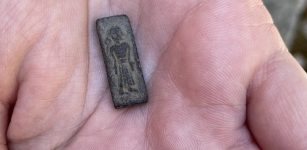 Rare And Tiny Ancient Stamps Found In Falster May Show The Way To An Unknown King’s Home
Archaeology | Jul 26, 2023
Rare And Tiny Ancient Stamps Found In Falster May Show The Way To An Unknown King’s Home
Archaeology | Jul 26, 2023 -
 New England’s Abandoned Stone Walls Deserve A Science Of Their Own
Featured Stories | Jan 5, 2024
New England’s Abandoned Stone Walls Deserve A Science Of Their Own
Featured Stories | Jan 5, 2024 -
 Controversial Stone Statues Of Niulang And Zhinyu And The Legend Of The Heavenly Queen And Milky Way
Artifacts | Sep 8, 2017
Controversial Stone Statues Of Niulang And Zhinyu And The Legend Of The Heavenly Queen And Milky Way
Artifacts | Sep 8, 2017 -
 New Evidence Of Roman And Medieval Leicester
Archaeology | Dec 10, 2015
New Evidence Of Roman And Medieval Leicester
Archaeology | Dec 10, 2015 -
 Archaeologists Search For The Tomb Of Biblical Joshua At Khirbet Tibnah
Archaeology | Aug 5, 2022
Archaeologists Search For The Tomb Of Biblical Joshua At Khirbet Tibnah
Archaeology | Aug 5, 2022 -
 History Of The Saltire – Scotland’s National Flag And World’s Oldest Sovereign Flag
Featured Stories | Apr 3, 2016
History Of The Saltire – Scotland’s National Flag And World’s Oldest Sovereign Flag
Featured Stories | Apr 3, 2016 -
 The Strange Story Of The Grave Of Copernicus
Featured Stories | Jan 5, 2024
The Strange Story Of The Grave Of Copernicus
Featured Stories | Jan 5, 2024 -
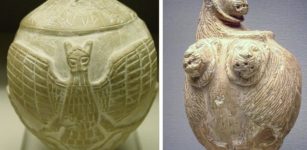 ‘Stone Club Head Of Mesilim’ Probably The Most Powerful Sumerian Ruler At That Time
Artifacts | Oct 12, 2017
‘Stone Club Head Of Mesilim’ Probably The Most Powerful Sumerian Ruler At That Time
Artifacts | Oct 12, 2017 -
 Incredible Roman Necropolis With Dressed Skeletons Buried In Ornate Tombs Discovered Close To The Ancient City Of Tarquinia
Archaeology | Jan 9, 2024
Incredible Roman Necropolis With Dressed Skeletons Buried In Ornate Tombs Discovered Close To The Ancient City Of Tarquinia
Archaeology | Jan 9, 2024 -
 World’s Oldest Moon Map Carved Into Ireland’s 5,000 Year-Old Tomb At Knowth
Featured Stories | Jun 25, 2014
World’s Oldest Moon Map Carved Into Ireland’s 5,000 Year-Old Tomb At Knowth
Featured Stories | Jun 25, 2014 -
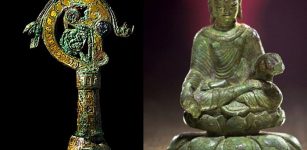 The Helgö Treasure: Bronze Buddha Statue, Coptic Scoop And A Crozier Depicting Biblical Tale Of Jonah
Artifacts | Mar 10, 2023
The Helgö Treasure: Bronze Buddha Statue, Coptic Scoop And A Crozier Depicting Biblical Tale Of Jonah
Artifacts | Mar 10, 2023 -
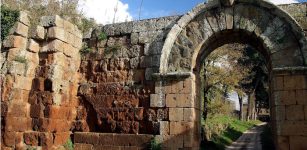 New Clues About The Fascinating Ancient Roman City Falerii Novi Revealed By Scientists
Archaeology | Sep 13, 2022
New Clues About The Fascinating Ancient Roman City Falerii Novi Revealed By Scientists
Archaeology | Sep 13, 2022 -
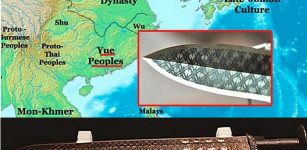 Superior Sword Of Goujian: Jian Weapon And Legend Of Immortal With Good Advice
Artifacts | Oct 15, 2019
Superior Sword Of Goujian: Jian Weapon And Legend Of Immortal With Good Advice
Artifacts | Oct 15, 2019 -
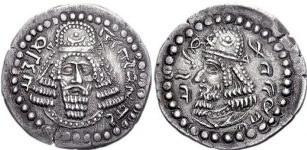 The Rise And Fall Of The Sasanian Empire
Civilizations | Jun 19, 2019
The Rise And Fall Of The Sasanian Empire
Civilizations | Jun 19, 2019 -
 New Denisovan Fossil: Extinct Humans Inhabited Tibetan Plateau For 160, 000 Years – Study
Human Beginnings | Jul 4, 2024
New Denisovan Fossil: Extinct Humans Inhabited Tibetan Plateau For 160, 000 Years – Study
Human Beginnings | Jul 4, 2024 -
 Wilhelm Tell: Famous Legendary Crossbowman And Swiss Patriot – Symbol Of Freedom And Dignity
Featured Stories | Nov 2, 2016
Wilhelm Tell: Famous Legendary Crossbowman And Swiss Patriot – Symbol Of Freedom And Dignity
Featured Stories | Nov 2, 2016 -
 Ming-Era Two Shipwrecks With 100,000 Ancient Relics Examined By Scientists
Archaeology | May 30, 2023
Ming-Era Two Shipwrecks With 100,000 Ancient Relics Examined By Scientists
Archaeology | May 30, 2023 -
 On This Day In History: Dramatic Battle Of Öland – On June 1, 1676
News | Jun 1, 2016
On This Day In History: Dramatic Battle Of Öland – On June 1, 1676
News | Jun 1, 2016 -
 European Medieval Burial Practices Were Different Than Previously Thought
Archaeology | Sep 13, 2021
European Medieval Burial Practices Were Different Than Previously Thought
Archaeology | Sep 13, 2021

